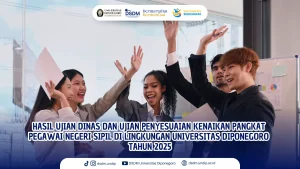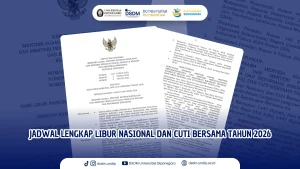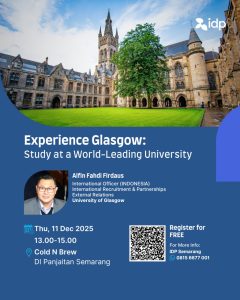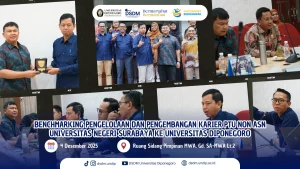The government continues to strive to improve the quality and welfare of lecturers in higher education, one of which is through the issuance of the Regulation of the Minister of Education, Culture, Research, and Technology (Permendikbudristek) Number 44 of 2024 which focuses on more comprehensive regulations related to the profession, career, and income of lecturers. This regulation not only emphasizes the academic aspect but also the welfare aspect which is the foundation for developing human resources, especially lecturers in Indonesia. Diponegoro University through the Directorate of Human Resources (DSDM) has held the Harmonization and Review of Lecturer Formation on Thursday, November 21, 2024 as a follow-up to the issuance of the Permendikbudristek. The event was held in the Meeting Room of the UPT Library Building on the 4th floor and was divided into two sessions, the first session was attended by the Heads of Study Programs of the Faculty of Medicine, Faculty of Science and Mathematics, Faculty of Engineering and Postgraduate School. The second session was attended by the Head of Study Programs of the Faculty of Economics and Business, Faculty of Law, Faculty of Cultural Sciences, Faculty of Social and Political Sciences, Faculty of Public Health, Faculty of Fisheries and Marine Sciences, Faculty of Animal Husbandry and Agriculture, Faculty of Psychology, and Vocational School. In the first session, the event was opened and moderated by Prof. Moh. Djaeni as Deputy Director of Evaluation and Career Development of DSDM, followed by material by the Director of Human Resources of DSDM, Prof. Mochamad Arief Budihardjo. In delivering the material, Prof. Mochamad Arief Budihardjo said that the presence of this new regulation is expected to be able to answer various problems regarding lecturers today. “Permendikbudristek 44/2024 includes clearer regulations so that the teaching profession is more dignified with increasingly protected employment rights. Lecturers are also facilitated in appointment, mobility, and certification, and universities are more autonomous in advancing the careers of lecturers,” added Prof. Arief. Prof. Arief hopes that optimizing the role of higher education institutions to support its implementation requires building a transparent monitoring and evaluation system. This will not only simplify the process of assessing lecturer performance but also encourage the creation of a competitive and innovative academic climate. This event was also attended by Prof. Purwanto, Head of the Planning and Development Agency, as a speaker in the second session. He delivered material on the Policy for the Preparation of Lecturer Formations in accordance with Permendikbudristek Number 44 of 2024. “Permendikbudristek 44/2024 clarifies the regulations so that the teaching profession is more dignified with increasingly protected employment rights. This new regulation also simplifies the rules for the appointment, transfer, and certification of lecturers, and increases the autonomy of universities in determining lecturer careers. Now lecturers have flexibility in planning their careers and determining their performance achievements, which are adjusted to the mutual agreement of the leadership of the university,” said Prof. Purwanto.






